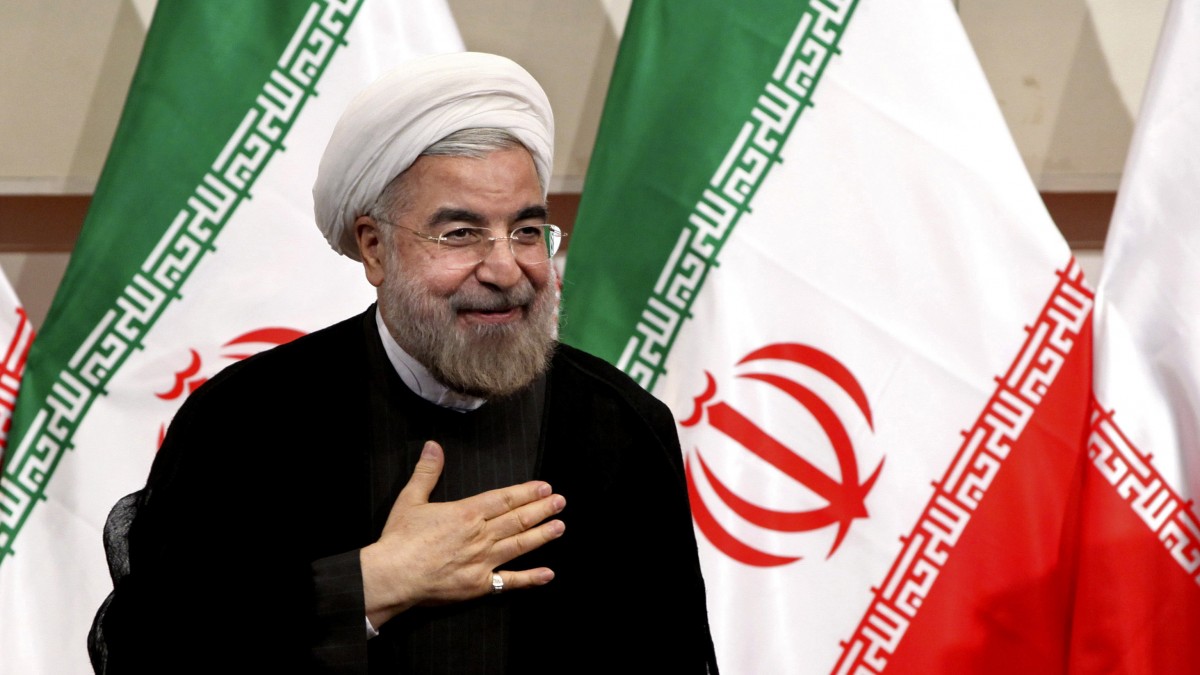 Presiden Hasan Rouhani places his hand on his heart as a sign of respect after speaking at a news conference, in Tehran, Iran. Photo: Ebrahim Noroozi/AP
Presiden Hasan Rouhani places his hand on his heart as a sign of respect after speaking at a news conference, in Tehran, Iran. Photo: Ebrahim Noroozi/AP
Making note of Israel’s existing, though undeclared, arsenal of nuclear weapons and pushing back against the steady stream of vitriol aimed at Iran amid ongoing negotiations over its civilian nuclear program, Iranian President Hassan Rouhani on Wednesday described the people of the United States and across the world as “too intelligent” to be taken by the “war-mongering” contained in remarks made by Israeli Prime Minister Benjamin Netanyahu during his high-profile visit to Washington, D.C. this week.
Speaking from Tehran, Rouhani indicated ongoing optimism following the latest round of talks between Iran and the P5+1 nations (the U.S., U.K., China, Russia, France, and Germany) which concluded in Switzerland on Wednesday. “The world is happy with the progress in the negotiations,” he said.
Though no agreement was finalized during the three-day summit in the Swiss town of Montreux, all sides expressed that progress was made despite the gaps between the parties that remain.
In his remarks, however, Rouhani continued by characterizing the Israeli government as an “aggressive and occupier regime” which stands alone in its opposition to reaching a peaceful settlement. Israel is angry with the talks, he said, “because it sees its existence tied with war and occupation.”
But, he said, “People of the world and America are too intelligent to take advice from such a war-mongering regime … which has pursued, produced and stockpiled a large number of atomic bombs in violation of international laws and away from the eyes of international inspectors.”
In a New York Times op-ed published Wednesday, Iran’s ambassador to the United Nations, Gholamali Khoshroo, echoed some of Rouhani’s sentiments as he repeated Iran has no ambitions or plans to shift its civilian nuclear program to one geared towards weaponization. “Despite extensive inspections by the International Atomic Energy Agency, no evidence has ever been presented to contradict the clear commitment by Iran’s leaders that they would under no circumstances engage in manufacturing, stockpiling and using ,” Khoshroo wrote. “Yet, in his speech this week, Mr. Netanyahu claimed the agency had determined that Iran had ‘a military nuclear program.’ This is a gross distortion of the agency’s position.”
He continued:
The paradox of the situation is that a government that has built a stockpile of nuclear weapons, rejected calls to establish a nuclear-weapons-free zone in the Middle East, made military incursions into neighboring states and flouted international law by keeping the lands of other nations under occupation, now makes such a big fuss over a country, Iran, that has not invaded another country since America became a sovereign nation.
Mr. Netanyahu seems to be in a state of panic at the prospect of losing this tool with which to attack Iran, as we do all in our power to address the genuine concerns of the international community and arrive at a settlement over our country’s nuclear energy program. Iran’s efforts, epitomized by the 2013 interim agreement, aim to resolve the issue with the P5-plus-1 group of countries (the five permanent members of the United Nations Security Council, plus Germany). Since Israel’s prime minister appears to be a person who thrives on chaos and conflict, we fear that he may have further plans to poison the atmosphere and sow discord among those involved in this historic effort.
Writing for The Progressive magazine, professor of politics and Middle Eastern studies Stephen Zunes reflected on Netanyahu’s fresh arguments to U.S. lawmakers this week by pointing out how disconnected from reality—especially when it comes to the ongoing P5+1 talks—they truly were. Though he acknowledged that some Democrats did boycott Netanyahu’s speech on Tuesday, he points out the “vast majority were in attendance” and the powerful pro-Israeli lobby continues to have significant influence in Congress were several pieces of legislation are now underway to sabotage hopes for a lasting deal with Iran. According to Zunes:
The Republicans and their Democratic allies are attempting to convince the American public to trust a right-wing foreign leader without any direct knowledge of the actual negotiations on what is in the best interest of peace and security over that of the elected President and America’s closest NATO allies. They cheered when Netanyahu made a series of demonstrably false claims regarding Iran: that the Shia republic collaborates with Al-Qaeda and other Sunni movements which are, in fact, its sworn enemies; Iran “dominates” Arab governments that are actually backed by the United States; Iran is supposedly “gobbling up” other nations; and that the nuclear deal would somehow “all but guarantee that Iran gets those weapons, lots of them.”
What is often forgotten is that Netanyahu’s alarmism is not new. During his first address before a joint session of Congress in 1996, he declared that Iran was “extremely close” to developing nuclear weapons and that failure to act immediately would risk “the lives of our children and our grandchildren.”
Zunes concluded, “What is disturbing is that so many in Congress still believe him.”

